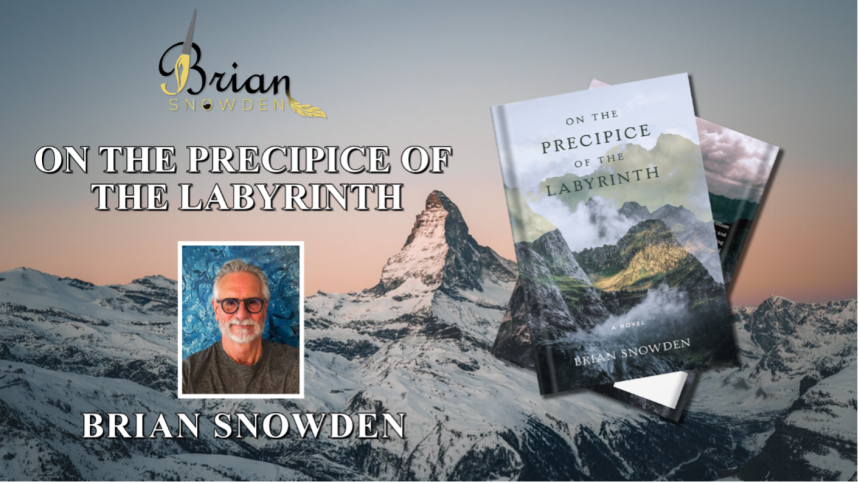There’s something quietly powerful about a debut novel that doesn’t try too hard to be loud. On the Precipice of the Labyrinth, by first-time author Brian Snowden, does just that; it draws you in, not with bombast, but with thoughtful reflection, rich history, and a protagonist whose inner world is as compelling as the political unrest unfolding around him.
Set in the early 1930s, against the backdrop of Spain on the brink of civil war, Snowden’s novel is a slow-burning literary journey. It follows William Benning, a young American with British roots, who leaves the relative safety and stability of his Virginia hometown to immerse himself in the chaos of a country he’s only read about. His goal? To understand a world bigger than his own. What he gets is a crash course in identity, time, memory, and the price of seeking answers in a place teetering on the edge of collapse.
If that sounds heavy, don’t worry. Snowden doesn’t preach. He invites. Through vivid scenes and a calm, introspective tone, he allows readers to step into William’s shoes and see the world through his increasingly wiser eyes.
In a recent interview, Snowden explained that much of the novel is rooted in personal experience, particularly the disorientation and wonder of traveling abroad for the first time. “Cultural shock is real,” he said. “It can either make you retreat or pull you deeper into discovery. William chooses discovery.”
Snowden’s own journey spans decades, languages, and continents. A long-time Spanish professor with a deep appreciation for literature and history, he brings a unique authority to the novel’s themes. His reflections are grounded, not academic. His storytelling feels lived-in, not distant. And that makes a difference.
William’s story begins with a sense of restlessness. Recently graduated, unsure of his future, he feels the tug of something more. Inspired by dinner-table debates among his father’s university colleagues and a lifelong curiosity about European affairs, he decides to go to Spain, a country few Americans at the time could place on a map, let alone understand. But it’s there, among strangers, in the middle of political tension and cultural transformation, that he begins to find himself.
One of the novel’s most compelling through-lines is the idea of retrospection; the way time alters our understanding of events. Snowden explores this not just through William’s personal reflections, but structurally, letting the reader absorb the story at the same thoughtful pace it unfolds for its protagonist. As Snowden says, “Time is a complicated concept, especially for the young. It’s only with distance that we begin to make sense of things.”
Another theme that runs deep is the tension between stability and stagnation. William grows up in a safe, structured environment. But as he ventures out, first across the U.S., then across the Atlantic, he starts to see how safety can become suffocating, and how comfort can lead to complacency. Spain, by contrast, is unstable but alive, torn between monarchy and republicanism, tradition and change. In that chaos, William doesn’t find certainty, but he does find clarity.
What elevates the novel beyond a personal journey is its treatment of language and culture. William’s fluency in Spanish, sharpened by a Cuban neighbor back home, gives him rare access to the people and politics of Spain. But Snowden is careful not to romanticize this. “No matter how well you speak the language,” he says, “you’re still an outsider. You can observe, you can empathize, but some labyrinths aren’t meant for you to enter.”
That image, the labyrinth, is at the heart of the novel’s title and metaphor. Spain itself becomes a maze of identities, ideologies, and histories, many of which William can only glimpse from the edge. His role is not to solve or fix anything, but to witness, to understand, and ultimately, to reflect.
The supporting cast, locals, travelers, refugees, and teachers serve not just to propel the plot, but to shape William’s growth. Small relationships leave lasting marks. A truck driver in New York, a Cuban teacher in Virginia, and a group of young Spaniards on the run from false accusations; each helps William navigate the complexity of the world beyond his borders.
Snowden, reflecting on these dynamics, points to generational contrast as a key theme. William’s father, a British immigrant shaped by war and the decline of the empire, brings a sense of caution to his worldview. William, by contrast, is driven by curiosity and a hunger for firsthand experience. “It’s hard to understand another generation’s choices unless you step into their time,” Snowden says. “That’s what William is trying to do, in his own way.”
So, what does On the Precipice of the Labyrinth leave us with? It’s not a cautionary tale, exactly. Nor is it a sweeping epic. Instead, it’s something quieter and perhaps more powerful: a meditation on the spaces between understanding and action, comfort and change, home and the world beyond.
For a first-time novelist, Snowden writes like someone who’s been at this for years. Maybe it’s because he has in life, if not yet in print. And while On the Precipice of the Labyrinth might not scream for your attention, it earns it with every quiet, deliberate page.






